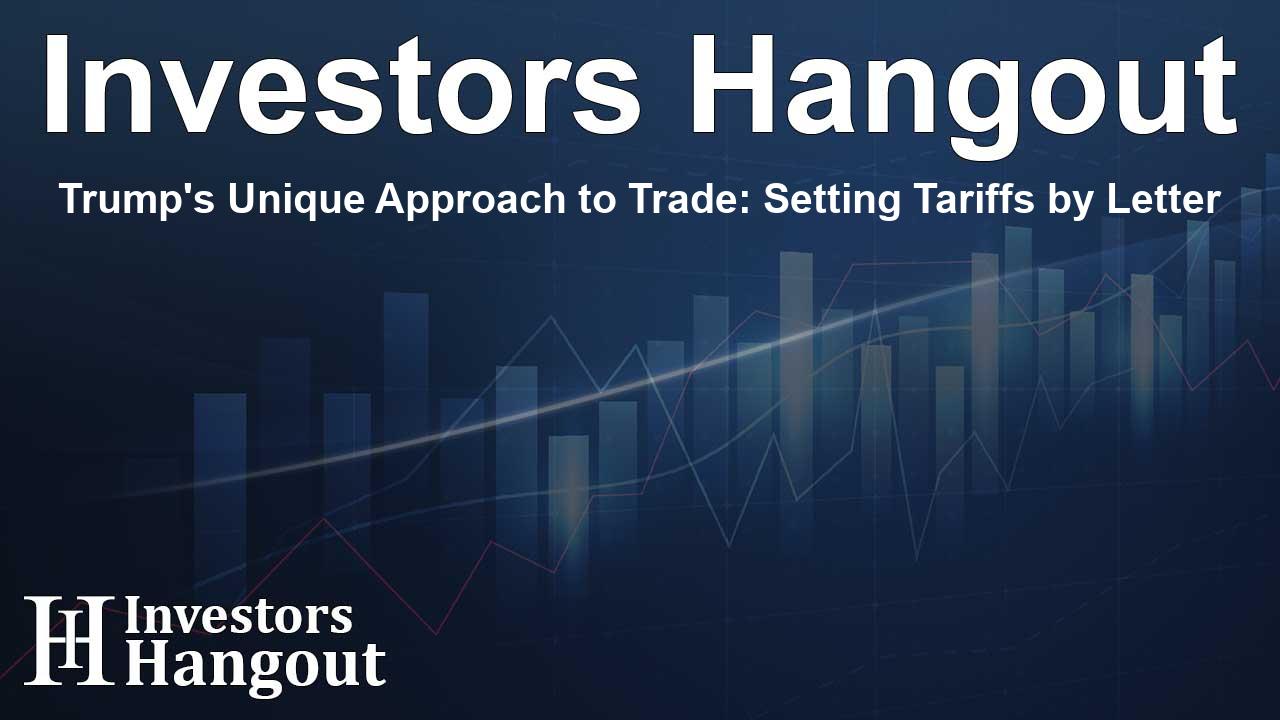Trump's Unique Approach to Trade: Setting Tariffs by Letter

Trump's New Strategy for Tariffs
President Donald Trump has unveiled an innovative approach to trade that allows him to impose new tariffs without entering into extensive negotiations. This method involves sending letters to trading partners that outline specific tariff rates applicable to them, streamlining the process considerably.
Understanding the Letter Approach
In a recent interview, Trump emphasized the importance of this direct communication method. He indicated that rather than traditional trade deals, he would prefer to notify nations of their tariff obligations via letters. He mentioned, "Congratulations, you're going to trade in the United States, and here's your tariff: 25%, 20%, or even up to 50%." This distinctive strategy implies that the U.S. will maintain a certain level of control over international trade.
The Impact of Tariff Letters
Trump’s letters, aimed at various countries including allies like Japan, place a significant emphasis on simplicity. For instance, he described a hypothetical letter to Japan stating, "You will pay a 25% tariff on your cars." This approach could reduce the complexity often associated with trade negotiations and allow for quicker implementation of tariffs.
Moving Away from Traditional Negotiations
When queried about the potential extension of the previously announced trade deal deadlines, Trump responded confidently that an extension would likely not be necessary. His administration currently views the handling of tariff assignments through letters as more efficient than face-to-face discussions, citing that they already possess the requisite data to proceed.
Broader Implications of His Tariff Plans
Previously, in mid-May, Trump indicated a strong preference for this unilateral tariff setting. His commentary reflects an awareness of the challenges posed by negotiating with numerous countries simultaneously. Trump mentioned the impracticality of meetings, especially when numerous nations express interest in trade relations. Amid ongoing modifications to existing tariffs, the administration has shown a commitment to revisiting how tariffs are assigned and communicated.
The Current Trade Landscape
As of now, the U.S. has solidified agreements, including one with the U.K., and is progressing towards additional arrangements with key international partners such as China. Nonetheless, Trump’s recent strategy of assigning tariffs via letters may signal a pivot away from more traditional negotiation tactics.
Responses from International Leaders
In conjunction with Trump’s tariff directives, international responses are taking shape. European Commission President Ursula von der Leyen expressed the EU's openness to trade discussions but also acknowledged that other options were being evaluated. This acknowledgment suggests that Trump's unilateral tariff application could alter the dynamics of ongoing and future trade negotiations with the EU and other global partners.
Looking Ahead: Trade and Tariff Strategies
As the global economy continues to navigate complexities and potential disruptions, Trump's approach to setting tariffs could redefine the traditional landscape of international trade. Rather than lengthy negotiations and established agreements, this method of correspondence may streamline processes but also provoke uncertainties among affected nations.
Frequently Asked Questions
What is Trump's new approach to tariffs?
Trump plans to impose tariffs by sending letters to trading partners instead of negotiating individual trade agreements.
How will this impact international trade?
This approach could simplify tariff implementation but may also lead to increased tensions with trading partners.
What example did Trump give regarding this method?
Trump cited Japan, explaining he would send a letter imposing a 25% tariff on their cars.
Has any trade deals been finalized recently?
Yes, a trade deal with the U.K. has been signed, and discussions with other trading partners, including China, are underway.
How are other countries responding to these changes?
Leaders like Ursula von der Leyen of the EU have expressed openness to trade talks but are also exploring other alternatives amidst this tariff strategy.
About The Author
Contact Hannah Lewis privately here. Or send an email with ATTN: Hannah Lewis as the subject to contact@investorshangout.com.
About Investors Hangout
Investors Hangout is a leading online stock forum for financial discussion and learning, offering a wide range of free tools and resources. It draws in traders of all levels, who exchange market knowledge, investigate trading tactics, and keep an eye on industry developments in real time. Featuring financial articles, stock message boards, quotes, charts, company profiles, and live news updates. Through cooperative learning and a wealth of informational resources, it helps users from novices creating their first portfolios to experts honing their techniques. Join Investors Hangout today: https://investorshangout.com/
The content of this article is based on factual, publicly available information and does not represent legal, financial, or investment advice. Investors Hangout does not offer financial advice, and the author is not a licensed financial advisor. Consult a qualified advisor before making any financial or investment decisions based on this article. This article should not be considered advice to purchase, sell, or hold any securities or other investments. If any of the material provided here is inaccurate, please contact us for corrections.
